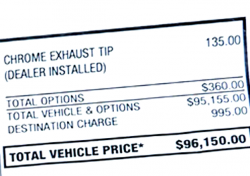
— A GM destination charge lawsuit has been dismissed after two customers claimed General Motors makes a profit when vehicles are delivered to dealerships.
The destination charge lawsuit further alleges GM “misleads reasonable consumers into believing its ‘Destination Charge' reflects the actual cost of shipping its vehicles to their ‘destination,' not the cost of shipping its vehicles plus profit.”
The destination charge class action lawsuit was filed by California plaintiff Robert Romoff who paid a $1,195 destination charge for his vehicle, and New Jersey plaintiff Joe Siciliano who paid a $995 destination charge.
According to the destination charge lawsuit, GM added the delivery fees to the new vehicle window stickers but failed to disclose that GM made a profit from the destination charge.
This allegedly deceived consumers because the real cost to GM for delivering a new vehicle isn't reflected on the window sticker, or what is called the Monroney label.
The class action lawsuit alleges GM window stickers, “break out [a] Destination Charge separate and apart from the base MSRP and include it as an add-on.”
This disclosure is mandated by the Federal Automobile Information Disclosure Act, which requires manufacturers to list “the amount charged to the dealer for the transportation of the car to the place of delivery.”
But the two plaintiffs argue GM's destination charge has little to do with getting the vehicle to its intended destination and instead is used as a “vessel for profit.”
The plaintiffs also allege GM has increased the amount of the destination charge but the increase doesn't have anything to do with the costs of shipping new vehicles.
Motion to Dismiss the GM Destination Charge Lawsuit
General Motors told the judge its conduct was not deceptive because the amount and existence of the destination charge and total vehicle price was fully disclosed prior to purchase.
GM contends it had no duty to disclose any additional information about the destination charge or whether profit is included. The automaker also argues the entire issue of profit in a destination charge "is not a material fact to a reasonable or average consumer."
Judge William Q. Hayes agreed and dismissed the entire GM destination charge lawsuit.
"Reasonable or average consumers would not be surprised to learn that the price of goods often includes profit for the seller. The term “Destination Charge” does not reasonably imply an absence of profit." — Judge Hayes
While the two plaintiffs claim a reasonable or average consumer would not expect the GM destination charge to include a profit, the judge "concluded that a reasonable or average consumer would not expect the Destination Charge to exclude profit."
The GM destination charge lawsuit was filed in the U.S. District Court for the Southern District of California: Romoff, et al., v. General Motors LLC.
The plaintiffs are represented by Kaliel Gold PLLC, and Kopelowitz Ostrow Ferguson Weiselberg Gilbert.




